Yes. Insurance for a single day is available.
Essential Guide to Renting a Car in France: Top Tips for Stress-Free Travel
PUBLISHED ON Feb, 21 2024

Ready to explore France at your leisure with a rental car? This article dives into the essentials of renting a car in France, detailing how to find the right agency, understand legal requirements, and navigate with confidence. With practical tips and clear information, you’ll be prepared for a seamless rental experience, allowing you to focus on the joy of the journey. Let’s get you on the road.
Key Takeaways
- Compare rental prices and choose a manual car for savings, but consider overall value. Book in advance to secure the best rates and availability.
- Meet legal rental requirements: over 21 years old, full license, and possibly an International Driving Permit. Always carry necessary documents like registration and insurance.
- Inspect the rental car thoroughly before use, adapt to French driving norms, and be aware of tolls and refueling nuances. Understand parking rules to avoid fines.
Choosing the Right Car Rental Company in France
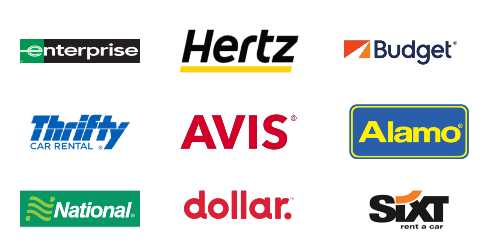
Car rental companies in France
France is a playground for travelers, offering a plethora of international and local car rental companies to cater to various needs and preferences. The options are as diverse as the French landscape, from the established market players like Europcar and ADA, to newcomers like Ucar and niche car rental agency like France Cars, each with their unique services that may appeal to different customers. With numerous car rental locations available, the reputation of these companies is as important as the stunning French vistas you aim to explore, so it’s worth doing some research before making a choice on a French rental car.
Given the variety of car rental companies available, you should evaluate both their services and pricing to find the best car rental companies. Some companies may lure you with cheap rental cars, but it’s the overall package of services that adds value to your French vacation. So, whether you’re planning a leisurely drive along the French Riviera or an adventurous journey in Southern France, choosing the right car rental company is the first step towards a memorable road trip.
Comparing Prices and Services
Admittedly, everyone appreciates a good deal, particularly when renting a vehicle. But how do you ensure you’re getting the best bang for your buck? Comparison websites like DiscoverCars.com and AutoEurope make it easy for you, allowing you to compare prices and services from both major and local car rental brands in France quickly. Long-term travelers get to enjoy competitive deals on long-term car rentals and short-term lease options that may prove to be more economical.
Pro tip: choosing a manual transmission car can lead to cost savings as they are generally cheaper to rent than their automatic counterparts in France. So, who said you couldn’t enjoy the beauty of France on a budget with the cheapest rental cars?
Remember, though, the final price is not the only factor to consider. Look at the services included in the package and the terms and conditions of the rental agreement. Some car rental deals may seem attractive at first glance but might lack essential services or have restrictive conditions. It’s all about getting the best value for your money, and that means finding a balance between cost and service.
Booking in Advance
Once you’ve selected the optimal car rental company for your French journey, the next step is… You should proceed to reserve your rental vehicle. And the golden rule here is to book as early as possible. Advance booking ensures the best possible prices and availability, especially for preferred vehicle types like automatic cars, which tend to sell out quickly. Plus, it often allows you to choose rates that include cancellations, providing greater flexibility and peace of mind.
Early booking not only secures better deals but also ensures a more seamless car rental process, contributing to a stress-free travel experience in France. So why wait? Book your rental car today and start looking forward to exploring the charming French cities, the glamorous French Riviera, and the spectacular Southern France countryside at your own pace!
Necessary Documents and Legal Requirements
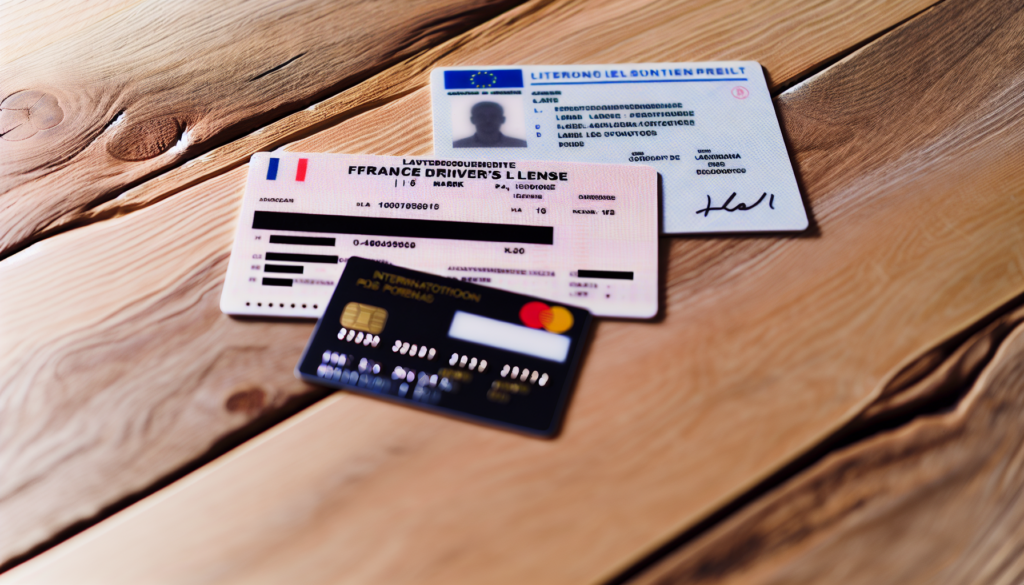
Necessary documents for renting a car in France
Having secured a favorable deal on your rental car, you must now focus on an essential yet less glamorous aspect of car rental in France – legal prerequisites. First things first, you need to be at least 21 years old, which is the legal driving age, to rent a car in France, and if you’re below 25, be ready to pay a young driver surcharge. A full driving license valid for at least one year is typically required.
If you’re a U.S. citizen, your valid driver’s license, if held for at least one year, is valid for car rentals. However, if it’s not in French or the Roman alphabet, you’ll need an official translation or an International Driving Permit. Non-EU citizens must have an IDP alongside their national driving permit if staying for less than 90 days, and their license is not in French. And don’t forget your credit card!
Most car rental companies in France have the following requirements:
- The renter’s credit card must be in their own name.
- Non-EU citizens need to provide a passport as proof of identity.
- EU citizens can present any form of valid identification.
Lastly, ensure all necessary vehicle documentation, such as the car’s registration and insurance, is present in the glove compartment.
International Driving Permit
Since we are discussing licenses, it’s worth mentioning the International Driving Permit (IDP). Although not required by French law, some rental car companies in France may request an IDP, especially for non-EU citizens. Each car rental company has its policies, and while an IDP is not legally mandatory to rent a car in France, some may insist on it. It’s always better to be safe than sorry, so if you’re a tourist planning to drive in France, it’s a good idea to confirm with your chosen rental agency to avoid any issues. After all, who wants to deal with legal hurdles while on a dream French vacation?
An IDP serves as proof that you are legally allowed to drive in the country you’re visiting. It contains translations of your driver’s license in various languages, making it easier for foreign authorities to interpret your home license. So, even if it’s not a legal requirement in France, having an IDP might still be worth considering for a smooth and hassle-free driving experience.
Insurance and Additional Coverage
With your license in order, it’s time to address insurance. Before you hit the open French roads, you need to ensure you’re covered in case of any mishaps. Start by checking with your insurance and credit card company to confirm existing auto coverage, as third-party liability insurance is a legal requirement and you may already have valid insurance, including collision damage waiver.
While Collision Damage Waiver (CDW) or Theft Protection coverage is not mandatory in France, it’s important to arrange for such additional coverage if not included in your existing policy, as they may come at an extra cost. If you’re using your credit card’s collision coverage, make sure the rental payment is made with the card that offers the benefit, and verify directly with the credit card company that the policy covers car rental insurance in France. Always keep the insurance certificate within the rental car and confirm the location of proof-of-insurance documents along with details on emergency roadside services from the rental agent.
The basic CDW does not typically cover certain types of damage, like windscreens, tyre punctures, or undercarriage damage. That’s where Super Collision Damage Waiver (SCDW) comes to reduce the excess. If you want more comprehensive coverage, Full Protection packages can offer savings by bundling Excess Waiver, Roadside Assistance, and zero deductible excess.
While SCDW may double your rental cost, CarInsuRent’s car rental insurance for France stands out as a favorable choice for several reasons:
- Comprehensive Coverage: CarInsuRent offers extensive coverage for car hire excess, providing you peace of mind. This insurance covers expenses related to windscreen damage, theft, misfuelling, breakdown, and towing, up to a generous limit of US$ 4,500.
- Cost Savings: By opting for CarInsuRent’s Car Hire Excess Insurance, you can avoid overpaying at car hire desks abroad. Booking this insurance online before traveling ensures competitive rates and helps save money in comparison to purchasing excess coverage directly from rental companies.
- Ease of Booking: The process of booking our Car Hire Excess Insurance is straightforward and can be conveniently completed online before embarking on the trip. This simplicity ensures a hassle-free experience for you, allowing you to focus on enjoying their journey.
- Positive Reviews: CarInsuRent’s Car Hire Excess Insurance has garnered positive reviews from satisfied customers, highlighting its reliability and effectiveness in providing coverage during car rentals abroad. Such testimonials from previous users attest to the quality and value of this insurance option.
Compare and Buy Car Rental Insurance in France
Get StartedI have bought two yearly policies with CarInsurent so far based on the good reviews here. Thinking that I would never need to use it, unfortunately I was wrong and had an accident with my rental car while traveling abroad. I'm glad to say that CarInsuRent fully reimbursed me promptly for the excess that I was charged. I'm a very satisfied customer!
In summary, Our car rental insurance for France is a preferred choice due to its comprehensive coverage, cost-effectiveness, ease of booking, and positive customer feedback. It offers you the necessary protection and financial security while renting a car abroad.
Tips for a Smooth Car Rental Experience

Vehicle inspection for rental car
Now that all legal aspects are taken care of, let’s proceed to some useful advice for a hassle-free car rental experience. Consider the necessity of the car during the initial part of your stay. If you’re spending the first few days in a city like Paris, you might not need a car immediately, and public transportation could be a more convenient and cost-effective option. When picking up the rental car, make sure to request or confirm if an English version of the contract is available for better understanding of the terms.
Get acquainted with the car’s essential features, including how to operate windshield wipers, headlights, and the gearshift of the manual car, particularly how to engage reverse. Perform a brief test drive in the parking lot, checking functions like mirrors, gear shifting, backing up, and the operation of lights. Remember to return the car on time to avoid additional rental charges, as returning the car late often results in an extra day’s fee. Lastly, when returning the car during a time the rental office is closed, leave the keys in a designated drop box if this is the common practice or instructed by the rental agency.
Vehicle Inspection
Upon receiving the keys to your rental car, you should thoroughly inspect the vehicle. Here are the steps to follow:
- Inspect the vehicle for any existing damage, such as scratches or dents.
- Take photos with a date/time stamp to prevent any disputes later on.
- Have an attendant go over the car with you to confirm the condition.
- Ensure that any damage is properly documented on the report.
- Request a copy of the report for your records.
By following these steps, you can ensure that you are not held responsible for any pre-existing damage to the rental car.
Safety should always be a priority. Here are some steps to take before driving:
- Check the vehicle’s lights, brakes, hazard lights, and horn to ensure they function correctly.
- Before leaving the parking lot, verify that the fuel tank is full.
- Check all fluid levels, including oil and windshield washer fluid.
- Ensure the presence and condition of a spare tire.
- Adjust the car’s seat and mirrors for comfort and visibility.
- Familiarize yourself with the vehicle’s controls, particularly how the lights and wipers work.
- Practice engaging the reverse gear.
Lastly, examine the interior of the car, including seats and any plastic components, for signs of damage or significant wear and ensure they are recorded if present.
Navigating French Roads
After completing the vehicle inspection, you’re ready to commence your journey! Navigating French roads may seem daunting, but with a few tips, you’ll be driving like a local in no time. Be aware of the prohibitory road signs in France that indicate various restrictions, including speed limits, overtaking prohibitions, and entry restrictions for certain vehicle types. Also, keep in mind that in France, right-of-way is often given to vehicles coming from the right unless otherwise marked.
Using a reliable GPS navigation system which includes live traffic updates can help you avoid congestion and navigate road closures in France. Navigating the narrow roads in French towns and cities requires attention to road signs and can be facilitated by an up-to-date navigation system. And remember, driving is not just about getting from point A to point B; it’s about enjoying the journey. So, relax and take in the beautiful French landscapes as you go.
Toll Booths and Gas Stations
While traversing French roads, anticipate encountering toll booths and petrol stations. Automated toll booths in France may not accept credit cards without an integrated chip and PIN; it’s recommended to have change available as some booths do not give change. Toll prices on France’s major roads and highways range approximately from €10 to €50 per journey.
When it comes to refueling, you pump gas first and then pay, without the need to pay before pumping. Gas stations located at supermarkets typically offer cheaper fuel than those on the Autoroute, with potential savings of at least 5%. Diesel, known as ‘gazole’, is usually less expensive in France and offers better mileage than unleaded petrol. Be aware that manned gas stations in rural areas of France may close for lunch between 12:00 – 14:00, so plan your refueling accordingly to avoid inconvenience.
The average price of gas in France is around 1.76 EUR per liter, which is generally quite high compared to the US. Remember to refuel your rental car before returning it and keep the receipt to avoid extra charges. And don’t forget to plan your travel budget, including the additional costs for fuel and highway tolls.
Understanding French Road Rules and Regulations
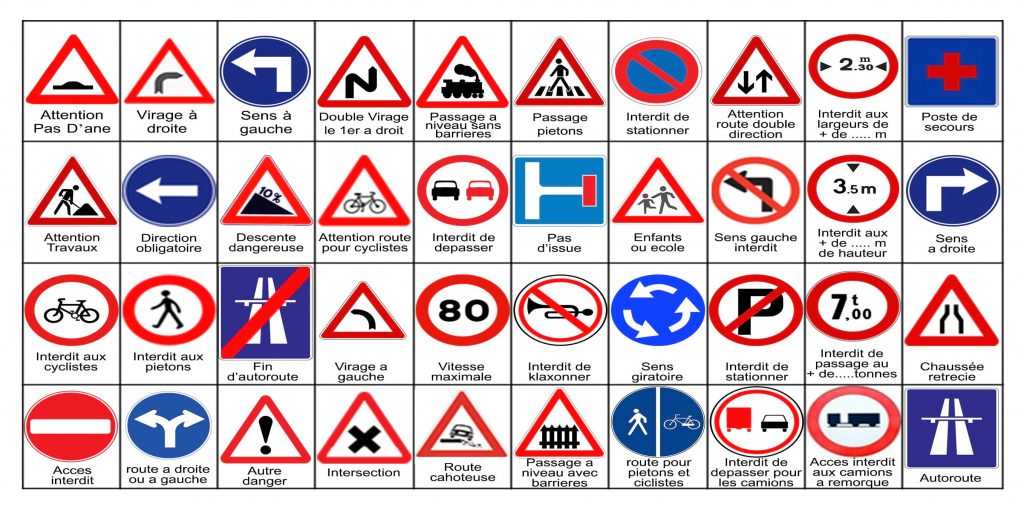
French road signs and regulations
Having covered the fundamentals, it’s time to examine French road rules and regulations in detail. France has general speed limits of:
- 50 km/h in urban areas
- 80 km/h on non-urban roads
- 90-110 km/h on dual carriageways
- 130 km/h on motorways, with reduced limits during wet weather
Mandatory road signs in France dictate specific actions such as turning rights and usage of snow chains, while priority signs establish traffic precedence at junctions, and prohibitory signs restrict vehicle types and maneuvers.
Warning road signs marked in red or yellow caution drivers of potential dangers, and informational signs communicate road rules and directions. Parking is restricted to less than 24 hours in one spot on the roadside, with designated ‘No Parking’ zones indicated by blue and red signs, and complex alternating rules signposted with dates. Lastly, the Crit’Air emissions sticker is required for all vehicles, particularly important for rentals, to access low-emission zones in French cities aimed at reducing pollution.
Speed Limits and Traffic Laws
You will quickly realize when driving in France that speed limits are indicated in kilometers per hour instead of miles. And these aren’t mere suggestions; they’re laws. The standard speed limit on French motorways is 130 km/h, which is reduced to 110 km/h in rainy weather. Drivers should reduce speed during poor weather conditions such as heavy rain or fog.
Speed limits also vary depending on where you’re driving. Be cautious and aware of speed limits when entering urban areas in France, even if there are no speed signs to guide you. And remember, these speed limits are there for a reason. Driving within the speed limit not only keeps you on the right side of the law but also ensures your safety and the safety of others on the road. So, always keep an eye on that speedometer!
Parking in France
Securing a parking spot in a foreign country may pose a significant challenge. But don’t worry, we’ve got you covered. When visiting larger cities like Paris, Marseille, or Bordeaux, it’s advisable to:
- Park outside the city center and use public transportation to avoid congestion and high parking fees.
- In paying parking zones, fees are regulated by meters or pay and display machines.
- Parking charges might be waived during midday from 12:00pm to 2:00pm and overnight from 7:00pm until 8:00am.
Limited free parking zones allow parking for 1-2 hours, provided a ‘disque de stationnement’ is displayed, indicating the arrival time, which can be bought at local shops. Lastly, remember that disabled parking spaces require the display of a blue GIG – GIC parking badge to indicate authorized usage.
So, whether you’re visiting the Arc de Triomphe or exploring the French Riviera, knowing the parking rules will ensure a hassle-free experience.
Exploring France by Car: Top Destinations and Scenic Routes
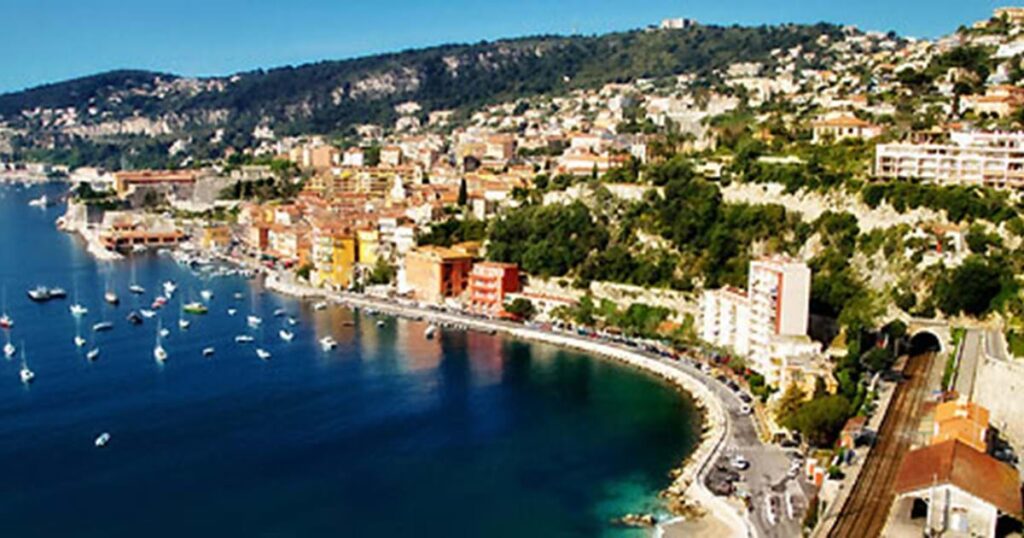
Scenic coastal drive in France – LeShuttle
After discussing the fundamentals of car rental and driving in France, we can now turn to the exciting part – touring France’s premier destinations and picturesque routes! Planning an efficient route involves understanding the country’s road types, including Autoroutes (A), Routes Nationales (N), and Routes Départementales (D). Whether you’re cruising along the French Riviera via Les Corniches or exploring the cultural richness of the Loire Valley, renting a car allows you to discover France at your own pace.
France offers a feast for the senses, with destinations such as:
- The vibrant lavender fields of Provence
- The dramatic cliffs of the Gorges du Verdon
- The Route des Vins de Provence, a scenic journey through vineyards and renowned wine-producing regions
- The Gorges du Tarn route, showcasing idyllic villages and stunning viewpoints
These destinations are perfect for those seeking a blend of natural beauty and cultural richness.
Coastal Drives
France’s diverse coastlines offer some of the most breathtaking scenic drives in the world. Whether you’re cruising along the glamorous French Riviera or exploring the historic Normandy coast, each journey offers a unique blend of stunning vistas and maritime charm. The Route des Crêtes showcases panoramic views of the Mediterranean, hidden coves, and shimmering sea vistas, while the Côte Vermeille offers rugged cliffs and picturesque fishing villages renowned for sweet wines.
Les Corniches, comprising the Grande Corniche, Moyenne Corniche, and Basse Corniche, present a series of coastal views and charming villages on the Côte d’Azur, perfect for a leisurely drive. And for the ultimate driving experience on the French Riviera, consider renting a convertible car. There’s nothing quite like the open-air feel that enhances the coastal beauty and makes your trip truly unforgettable.
Countryside Escapes
If coastal drives aren’t your thing, fear not! France’s countryside is equally captivating. From fairy-tale villages like Riquewihr to cliff-topped gems like Saint-Cirq Lapopie, the French countryside offers a serene escape from the hustle and bustle of urban areas. The Lavender Route and Route des Vins de Provence offer scenic drives through iconic lavender fields and vineyard landscapes, making for an unforgettable road trip.
Whether you’re a wine connoisseur or a nature lover, a drive through regions like Champagne, Burgundy, or along the Alsatian Wine Route is bound to leave you mesmerized. Just remember, when exploring France’s countryside by car, it’s advisable to drive with caution and at a leisurely pace. After all, it’s all about enjoying the journey, not just the destination.
Additional Considerations for Renting a Car in France
Before wrapping up, let’s address a few more points to consider when renting a car in France. For starters, rental cars in France must include mandatory equipment by law, such as a warning triangle, reflective vest, and first aid kit. It’s also crucial to be mindful of the company’s policies if you plan to drive across international borders.
Remember, the more prepared you are, the smoother your road trip will be! From understanding car seat laws for children under the age of 10 to following winter driving tips, these additional considerations ensure a safe and hassle-free driving experience. So as you embark on your French adventure, keep these tips in mind and get ready for an unforgettable journey!
Crossing Borders with Your Rental Car
If your French journey involves side trips to nearby countries, it’s imperative to notify your rental company. Most rental companies in France allow renters to drive vehicles across international borders, but specific policies and additional fees apply. For instance, entering Switzerland requires the purchase of a ‘vignette’ sticker, and going to Monaco or Italy may come with unique insurance requirements.
Dropping off a rental car in a different country than where it was rented can be possible but usually incurs substantial costs. Countries that can be easily accessed by car from France include Belgium, Spain, and Switzerland. So, whether you’re planning to cross borders or stay within France, keeping these considerations in mind can help you avoid unexpected surprises on your journey.
Car Seat Laws in France
If you’re traveling with kids, it’s important to familiarize yourself with France’s car seat regulations. Children under the age of 10 must be seated in the back of the vehicle using an approved restraint system suitable for their size. Booster seats are required for children taller than 135cm but under the age of 10.
A child under 10 may also sit in the front in a rear-facing baby seat if the passenger airbag is deactivated and the seat is compatible with front placement. Non-compliance with the car seat laws can result in a fine of up to €750, with a standard on-the-spot fine being €135. So, for the safety of your child and peace of mind, it’s best to adhere to these laws.
Winter Driving Tips
Finally, if you’re planning a trip during the winter season, it’s crucial to heed some winter driving advice. Here are some tips to keep in mind:
- Carry required safety equipment like a reflective vest and warning triangle
- Use winter-specific gear like snow chains or studded tires, which are mandatory on certain roads during winter
- Adapt your behavior while driving in winter conditions by reducing speed, increasing following distances, and maintaining smooth driving maneuvers to prevent skids and retain control
In case of a breakdown, activate warning lights, don an emergency jacket, and place a safety triangle 30 meters behind the vehicle to alert other drivers. Heed traffic regulations specific to winter, such as giving way to snow-clearing and salt trucks, and complying with any diversions or roadwork-related safety measures.
Summary
Renting a car in France can turn an ordinary trip into an extraordinary journey, allowing you to explore at your own pace and discover hidden gems. From choosing the right rental company to understanding French road rules and regulations, there’s a lot to consider. But with the right preparation and knowledge, you’re all set for an unforgettable road trip through the beautiful landscapes of France. So, pack your bags, buckle up, and get ready for the adventure of a lifetime!
Frequently Asked Questions
Can I rent a car in France with a US drivers license?
Yes, you can rent a car in France with a US driver’s license, but it must be valid and either written in French or accompanied by an international driving permit. Having a passport or other photographic ID is also necessary.
Is it a good idea to rent a car in France?
Yes, it’s a good idea to rent a car in France if you want to explore the countryside and have the flexibility to go off the beaten path and discover unique regions. Bon voyage!
How old do you have to be to rent a car in france?
You have to be at least 21 years old to rent a car in France, and you must have held your license for at least one year. Keep in mind that if you’re 25 or younger, there may be a young driver surcharge.
What should I check during the vehicle inspection?
When doing a vehicle inspection, make sure to check for existing damage, verify the fuel tank is full, inspect all fluid levels, and ensure the spare tire is present and in good condition. This will help you ensure the vehicle is in good shape for your upcoming travels.
What are the speed limits in France?
In France, the speed limits are 50 km/h in urban areas, 80 km/h on non-urban roads, 90-110 km/h on dual carriageways, and 130 km/h on motorways, with reduced limits during wet weather. Drive safely!
Travel Tips and Guides
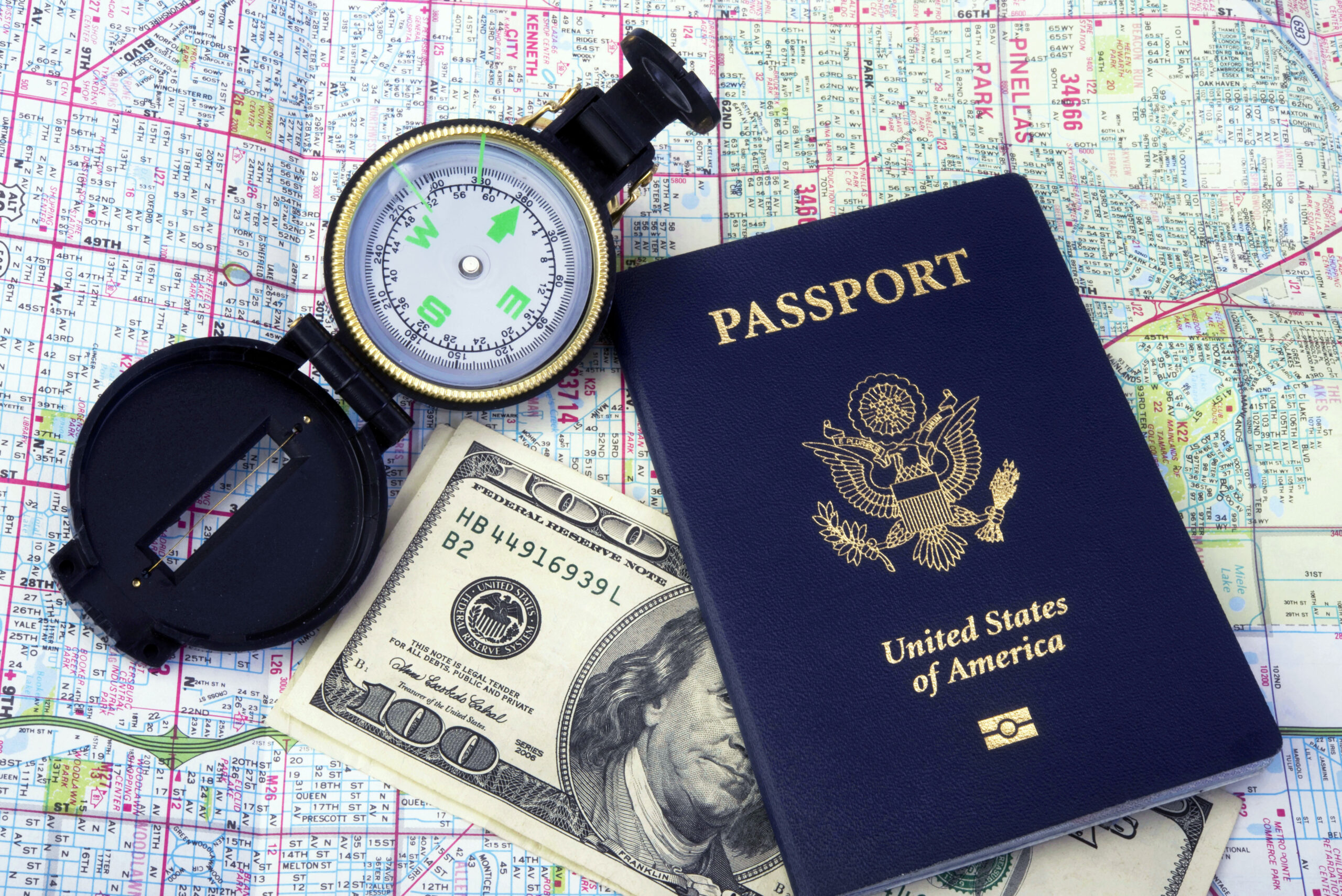
Navigate the World: How to Get Your AAA's International Driving Permit Effortlessly
Gil Farkash
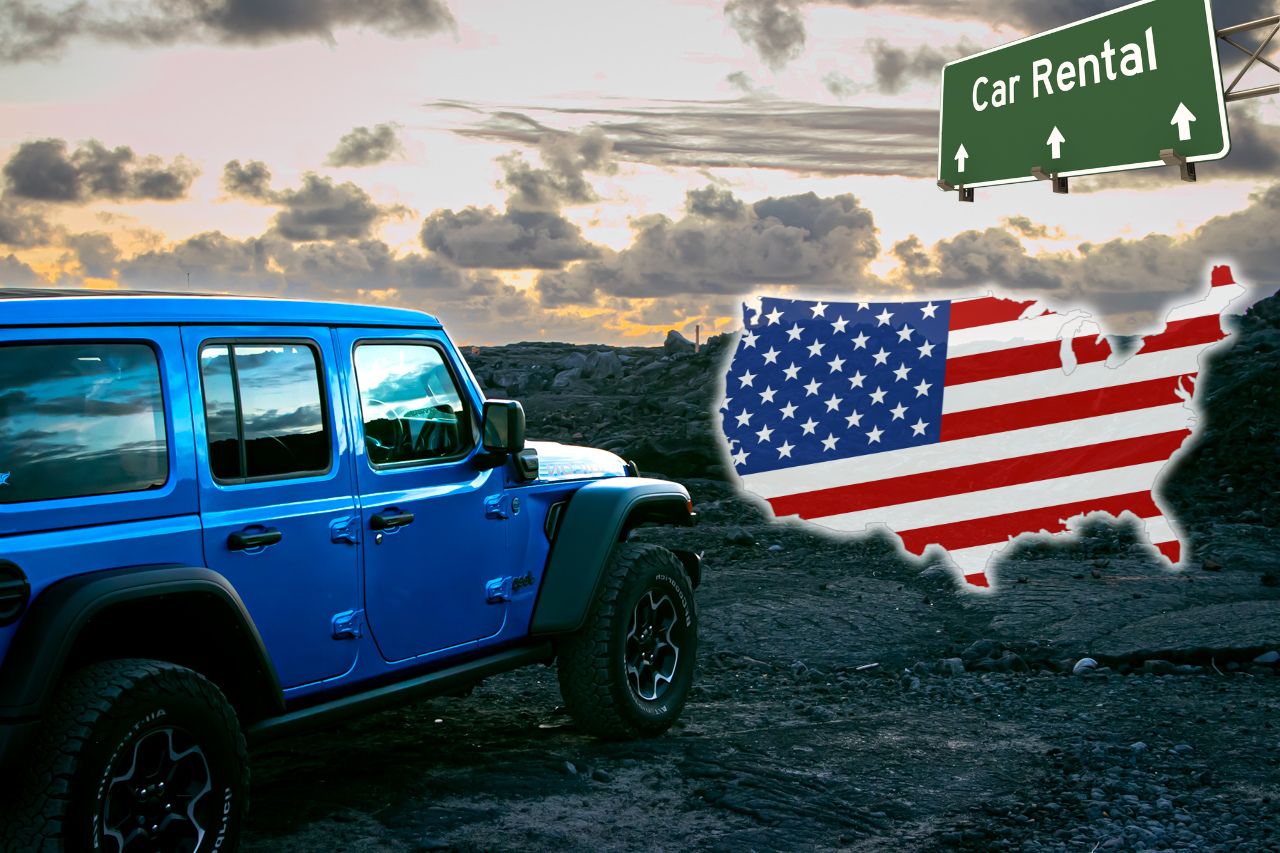
Top Tips for Stress-Free Renting a Car in USA: Your Ultimate Road Trip Guide
Gil Farkash
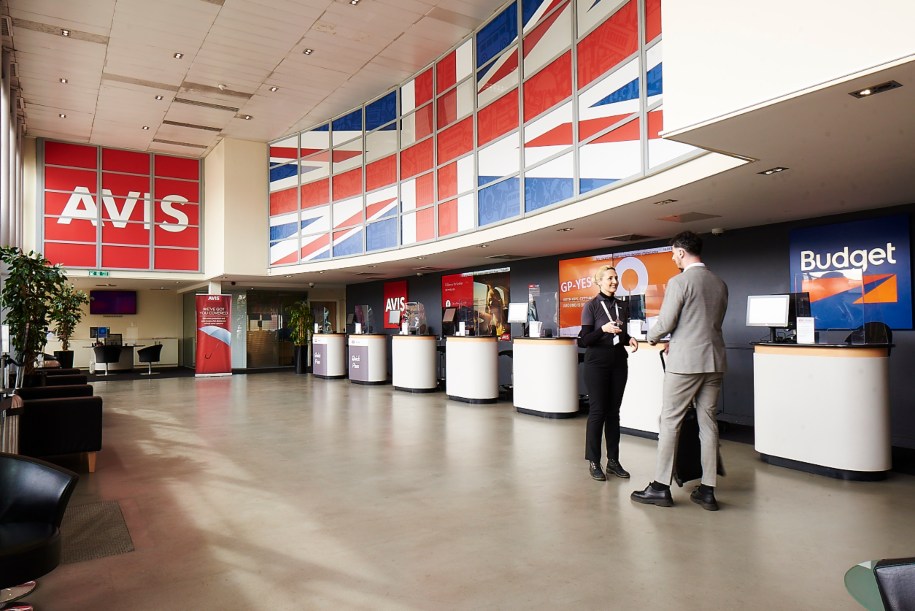
Essential Tips for Renting a Car in UK: Your Complete Guide
Gil Farkash
Frequently Asked Questions (FAQ)
No. We provide a single journey plan. You are covered from the time you pick up the rental car up to the time you return it or on the last date written on your Certificate of Insurance, whichever comes first.
No. You should purchase a policy before starting your travel.
Find the answers you’re looking for to the most frequently asked car hire insurance questions as well as other questions relating to our products and services.
